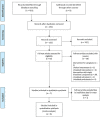Psychoeducation, motivational interviewing, cognitive remediation training, and/or social skills training in combination for psychosocial functioning of patients with schizophrenia spectrum disorders: A systematic review and meta-analysis of randomized controlled trials
- PMID: 36245879
- PMCID: PMC9561245
- DOI: 10.3389/fpsyt.2022.899840
Psychoeducation, motivational interviewing, cognitive remediation training, and/or social skills training in combination for psychosocial functioning of patients with schizophrenia spectrum disorders: A systematic review and meta-analysis of randomized controlled trials
Abstract
Objectives: Psychoeducation, motivational interviewing, cognitive remediation training, and social skills training have been found to be effective interventions for patients with schizophrenia spectrum disorders. However, their efficacy on psychosocial functioning when provided in combination remains unclear, compared with all types of control conditions. It would also be meaningful to explore the differences of efficacy in patients with first-episode psychosis (FEP) and those with longer term of illness.
Methodology: The present review followed the guidelines of Preferred Reporting Items for Systematic Reviews and Meta-Analyses (PRISMA). Full-text English journal articles of randomized controlled trials published in the past decade in the databases of PubMed, CINAHL Complete, Embase, and PsycINFO were searched. Included studies were all randomized controlled trials (RCTs) with participants diagnosed with schizophrenia spectrum disorders. The included studies should test combined interventions with at least two components from: psychoeducation, motivational interviewing, cognitive remediation training, and social skills training and incorporate assessment of psychosocial functioning at least at baseline and post-intervention.
Results: Seven studies were included for systematic review, and six of them were eligible for meta-analysis. Five out of the seven studies reported effects on psychosocial functioning that favored combined interventions over any type of control condition. A significant pooled effect was derived from the six studies, SMD = 1.03, 95% CI [0.06, 2.00], Z = 2.09, p = 0.04, I 2 = 96%. However, the pool effect became insignificant when synthesizing five of the studies with non-FEP patients as participants and four of the studies testing relative effects of combined interventions compared with stand-alone interventions/interventions with one less component. None of the included studies adopted motivational interviewing and only one of the studies worked with FEP patients.
Conclusion: Psychoeducation, cognitive remediation training, and social skills training in combination can effectively enhance psychosocial functioning of patients with schizophrenia spectrum disorders. It is warranted to conduct more RCTs to test the effects of different specific combinations of the above interventions on psychosocial functioning, especially in FEP patients.
Keywords: cognitive remediation training; first-episode psychosis; motivational interviewing; psychoeducation; schizophrenia; social skills training.
Copyright © 2022 Lu, Cheng, Tsang, Chen, Leung, Yip, Lin, Lam, Zhang, Zhao and Ma.
Conflict of interest statement
The authors declare that the research was conducted in the absence of any commercial or financial relationships that could be construed as a potential conflict of interest.
Figures
Similar articles
-
Feasibility and Efficacy of Virtual Reality Interventions to Improve Psychosocial Functioning in Psychosis: Systematic Review.JMIR Ment Health. 2022 Feb 18;9(2):e28502. doi: 10.2196/28502. JMIR Ment Health. 2022. PMID: 35179501 Free PMC article. Review.
-
Efficacy and acceptability of psychosocial interventions in schizophrenia: systematic overview and quality appraisal of the meta-analytic evidence.Mol Psychiatry. 2023 Jan;28(1):354-368. doi: 10.1038/s41380-022-01727-z. Epub 2022 Aug 23. Mol Psychiatry. 2023. PMID: 35999275
-
The future of Cochrane Neonatal.Early Hum Dev. 2020 Nov;150:105191. doi: 10.1016/j.earlhumdev.2020.105191. Epub 2020 Sep 12. Early Hum Dev. 2020. PMID: 33036834
-
The effect of motivational interviewing and/or cognitive behaviour therapy techniques on gestational weight gain - a systematic review and meta-analysis.BMC Public Health. 2023 Apr 1;23(1):626. doi: 10.1186/s12889-023-15446-9. BMC Public Health. 2023. PMID: 37005572 Free PMC article.
-
Effectiveness, Core Elements, and Moderators of Response of Cognitive Remediation for Schizophrenia: A Systematic Review and Meta-analysis of Randomized Clinical Trials.JAMA Psychiatry. 2021 Aug 1;78(8):848-858. doi: 10.1001/jamapsychiatry.2021.0620. JAMA Psychiatry. 2021. PMID: 33877289 Free PMC article.
Cited by
-
Evidence-based psychosocial interventions in schizophrenia: a critical review.Curr Opin Psychiatry. 2024 May 1;37(3):131-139. doi: 10.1097/YCO.0000000000000925. Epub 2024 Feb 15. Curr Opin Psychiatry. 2024. PMID: 38410981 Free PMC article. Review.
-
Attitude towards mental help-seeking, motivation, and economic resources in connection with positive, negative, and general psychopathological symptoms of schizophrenia: a pilot study of a psychoeducation program.Front Psychiatry. 2024 Mar 14;15:1353125. doi: 10.3389/fpsyt.2024.1353125. eCollection 2024. Front Psychiatry. 2024. PMID: 38550536 Free PMC article.
-
From contact coverage to effective coverage of community care for patients with severe mental disorders: A real-world investigation from Italy.Front Psychiatry. 2022 Nov 29;13:1014193. doi: 10.3389/fpsyt.2022.1014193. eCollection 2022. Front Psychiatry. 2022. PMID: 36523868 Free PMC article.
-
Motivational interviewing in postoperative rehabilitation and chronic disease management: Current findings and future research directions.World J Psychiatry. 2025 Jan 19;15(1):102737. doi: 10.5498/wjp.v15.i1.102737. eCollection 2025 Jan 19. World J Psychiatry. 2025. PMID: 39831005 Free PMC article.
-
Neurocognitive and social cognitive correlates of social exclusion in psychotic disorders: a 20-year follow-up cohort study.Soc Psychiatry Psychiatr Epidemiol. 2025 Feb;60(2):413-426. doi: 10.1007/s00127-024-02742-x. Epub 2024 Aug 2. Soc Psychiatry Psychiatr Epidemiol. 2025. PMID: 39090439
References
-
- Tandon R, Lenderking WR, Weiss C, Shalhoub H, Barbosa CD, Chen J, et al. The impact on functioning of second-generation antipsychotic medication side effects for patients with schizophrenia: a worldwide, cross-sectional, web-based survey. Ann Gen Psychiatry. (2020) 19:42. 10.1186/s12991-020-00292-5 - DOI - PMC - PubMed
Publication types
LinkOut - more resources
Full Text Sources
Miscellaneous




